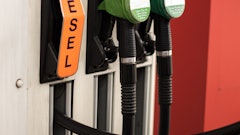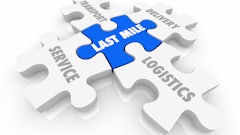Sofia, Bulgaria — June 8, 2007 — Inadequate transportation infrastructure and congestion will negatively affect worldwide economic growth in the years ahead, and urgent action is required globally to accelerate the pace of infrastructure development, warned Ron Widdows, CEO of Singapore-based APL, one of the world's top-ten container shipping lines.
Speaking before the European Conference of Ministers of Transport (ECMT) last week, Widdows told the continent's leading transportation officials, "If our transport infrastructure can't keep pace with the rate of growth, then big question marks hang over the continuation of the kind of economic prosperity that's been delivered this decade."
The 54-year-old ECMT, created to focus on Europe's transport issues, convened its meeting in Sofia to consider a single issue for the first time: "Congestion: A Global Challenge." Widdows became the first private-sector speaker to ever take part in the conference.
Taking a Global Approach
Acknowledging that transportation and congestion are global concerns, the ECMT took an additional step to expand its scope by launching the International Transport Forum. In addition to European Union and other European country ministers, ministers from Canada, Mexico and Japan, other non-European countries as well as the U.S. Department of Transportation and the United Nations were represented at the conference.
Widdows told the international audience that: "We are discussing an issue of worldwide importance. That's why it is encouraging that ministers from so many countries are meeting to discuss how best to address the impact that congestion has on global trade and economic growth. The initiative to focus on the problem as a global issue is to be commended."
This was the latest in a series of high-level alarms sounded by APL and Widdows to warn against overcrowding at seaports, highways and railways worldwide. It was the shipping executive's first major opportunity to address European and other major government ministers on the impact of supply chain congestion, following a series of engagements with the U.S. Department of Transportation and the Bush Administration's Domestic Policy Council in 2006.
Trade Growth Outpacing Infrastructure Expansion
Widdows told his audience of government leaders that transportation infrastructure can't keep pace with global growth in trade. By 2010, he said, global container volumes will be double the level of 2000. But in many of the world's key markets, he added, the transportation infrastructure won't be able to handle the load without negative impact to the flow of goods.
Massive investments are needed to modernize and expand the transport system, Widdows said: Otherwise, congestion will slow future economic growth rates, add enormous costs to global supply chains and could lead companies to reconsider their sourcing strategies.
To illustrate the problem, Widdows said that in the first quarter of 2007, only 46 percent of container vessels globally arrived at ports on time — the lowest level on record. At the port of Rotterdam, only 35 percent of vessels arrived on time. At European ports overall, less than 30 percent of vessels arrived on time.
The problem is caused by transport bottlenecks around the world, Widdows said. For example, he pointed out that:
Need for "Expedited, but Environmentally Sensitive Response"
Widdows called for an expedited, but environmentally sensitive response to the problems of congestion. He urged governments — including the European transportation ministers — shippers and transportation industry executives to collaborate on solutions.
"Everyone with a stake in global trade has a role to play," said Widdows. "Governments, shippers, transportation providers — we must all do, and pay, our fair share. We must all contribute ideas. And we must expect that it will take a long time."
Additional Articles of Interest
— Scared yet? Try reading these articles warning of looming threats to the supply chain:
Speaking before the European Conference of Ministers of Transport (ECMT) last week, Widdows told the continent's leading transportation officials, "If our transport infrastructure can't keep pace with the rate of growth, then big question marks hang over the continuation of the kind of economic prosperity that's been delivered this decade."
The 54-year-old ECMT, created to focus on Europe's transport issues, convened its meeting in Sofia to consider a single issue for the first time: "Congestion: A Global Challenge." Widdows became the first private-sector speaker to ever take part in the conference.
Taking a Global Approach
Acknowledging that transportation and congestion are global concerns, the ECMT took an additional step to expand its scope by launching the International Transport Forum. In addition to European Union and other European country ministers, ministers from Canada, Mexico and Japan, other non-European countries as well as the U.S. Department of Transportation and the United Nations were represented at the conference.
Widdows told the international audience that: "We are discussing an issue of worldwide importance. That's why it is encouraging that ministers from so many countries are meeting to discuss how best to address the impact that congestion has on global trade and economic growth. The initiative to focus on the problem as a global issue is to be commended."
This was the latest in a series of high-level alarms sounded by APL and Widdows to warn against overcrowding at seaports, highways and railways worldwide. It was the shipping executive's first major opportunity to address European and other major government ministers on the impact of supply chain congestion, following a series of engagements with the U.S. Department of Transportation and the Bush Administration's Domestic Policy Council in 2006.
Trade Growth Outpacing Infrastructure Expansion
Widdows told his audience of government leaders that transportation infrastructure can't keep pace with global growth in trade. By 2010, he said, global container volumes will be double the level of 2000. But in many of the world's key markets, he added, the transportation infrastructure won't be able to handle the load without negative impact to the flow of goods.
Massive investments are needed to modernize and expand the transport system, Widdows said: Otherwise, congestion will slow future economic growth rates, add enormous costs to global supply chains and could lead companies to reconsider their sourcing strategies.
To illustrate the problem, Widdows said that in the first quarter of 2007, only 46 percent of container vessels globally arrived at ports on time — the lowest level on record. At the port of Rotterdam, only 35 percent of vessels arrived on time. At European ports overall, less than 30 percent of vessels arrived on time.
The problem is caused by transport bottlenecks around the world, Widdows said. For example, he pointed out that:
- Emerging economies in India and Vietnam urgently need to build and expand ports and inland road and railway infrastructure.
- The leading consumer economies — Europe and the United States — need expansion and greater efficiency at ports.
- Europe in particular must find a means for rail transport to play a larger role since trucks continue to be the primary mode for inland transport, creating greater congestion on the roads and a negative impact to the environment.
Need for "Expedited, but Environmentally Sensitive Response"
Widdows called for an expedited, but environmentally sensitive response to the problems of congestion. He urged governments — including the European transportation ministers — shippers and transportation industry executives to collaborate on solutions.
"Everyone with a stake in global trade has a role to play," said Widdows. "Governments, shippers, transportation providers — we must all do, and pay, our fair share. We must all contribute ideas. And we must expect that it will take a long time."
Additional Articles of Interest
— Scared yet? Try reading these articles warning of looming threats to the supply chain:
- Aging Transportation System Putting Supply Chains at Risk, Exec Warns - Citing relentless trade growth and rising threat of economic gridlock, APL's Bowe renews calls for investment in transport infrastructure
- Five-step Plan Proposed for Improved Supply Chain Security - Regulation, targeting and collaboration are key, says APL security chief
- No Technological "Silver Bullet" Seen for Supply Chain Security - Retail industry association cautions against "superficial measures" for securing U.S. borders
- Katrina Called "Wake-up Call" for Business to Rethink Supply Chain Strategy - Latest "shock to the supply chain" should refocus attention on balanced inventory management models, Colography Group says
- U.S. Must Beef up Workforce Skills or Risk Losing Competitiveness, NAM Says - Manufacturer association chief Engler calls for "accelerated innovation" at Washington summit
- Retiring Workforce, Widening Skills Gap - Exodus of "critical talent" threatens U.S. companies: Deloitte Consulting survey
- RFID Talent Pool in Need of Filling, Survey Finds - 80 percent of companies see shortage of RFID talent to implement, service and support technology, CompTIA reports















